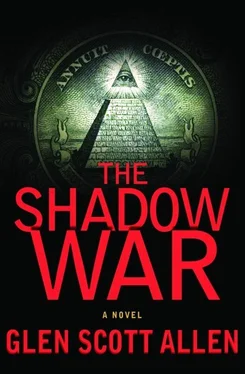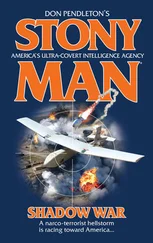Glen Allen - The shadow war
Здесь есть возможность читать онлайн «Glen Allen - The shadow war» весь текст электронной книги совершенно бесплатно (целиком полную версию без сокращений). В некоторых случаях можно слушать аудио, скачать через торрент в формате fb2 и присутствует краткое содержание. Жанр: Триллер, на английском языке. Описание произведения, (предисловие) а так же отзывы посетителей доступны на портале библиотеки ЛибКат.
- Название:The shadow war
- Автор:
- Жанр:
- Год:неизвестен
- ISBN:нет данных
- Рейтинг книги:5 / 5. Голосов: 1
-
Избранное:Добавить в избранное
- Отзывы:
-
Ваша оценка:
- 100
- 1
- 2
- 3
- 4
- 5
The shadow war: краткое содержание, описание и аннотация
Предлагаем к чтению аннотацию, описание, краткое содержание или предисловие (зависит от того, что написал сам автор книги «The shadow war»). Если вы не нашли необходимую информацию о книге — напишите в комментариях, мы постараемся отыскать её.
The shadow war — читать онлайн бесплатно полную книгу (весь текст) целиком
Ниже представлен текст книги, разбитый по страницам. Система сохранения места последней прочитанной страницы, позволяет с удобством читать онлайн бесплатно книгу «The shadow war», без необходимости каждый раз заново искать на чём Вы остановились. Поставьте закладку, и сможете в любой момент перейти на страницу, на которой закончили чтение.
Интервал:
Закладка:
"That's what I meant when I said Fletcher had leaked information, just not yet. He intended to leak something, that much is clear. To you."
CHAPTER 15
Wolfe immediately led Benjamin off down the hall to Fletcher's room. Once there, again Wolfe performed the ritual of examining the strip of tape on the doorjamb; once again he seemed satisfied that it had not been tampered with. He unlocked the door and they entered Fletcher's dark room.
Everything was as they had left it. Benjamin walked in and almost stumbled over the keyboard on the floor, as Wolfe had insisted on closing the curtains before turning on the small banker's lamp on the table. Then Wolfe switched on the laptop computer.
This time when it asked for a password, Wolfe immediately typed in "poisson," and the desktop with its few icons appeared. Then, as Benjamin had before, Wolfe double-clicked on the icon that read TEACUP-6. And as before, a small window appeared with the message ENTER PASSWORD FOR TEACUP INITIALIZATION.
Wolfe bent his fingers over the keyboard, then stopped.
"What do you think, 'franklin' with a small or capital F?" he asked.
Benjamin looked at the yellow paper where Wolfe had set it in the circle of light from the lamp. "Just small F, I think. He knew there was no way to designate capitals in Franklin's code."
"I agree," said Wolfe. He tapped the name, all in lowercase letters, into the waiting rectangle.
Nothing happened.
"Damn," Wolfe said. "If this doesn't work-"
"Wait," said Benjamin. "Look."
On the laptop screen, a new window had opened. It was a list of file names-but before they could read any of them, another window appeared on the screen.
CONVERT GADENHOWER DATA? (Y/N) it read.
"Gadenhower data?" said Benjamin. He looked at Wolfe. "Mrs. Gadenhower?"
Wolfe nodded. "He had spoken to her just that day, remember. And told her he was going back to his room to type in notes from their conversation. And I suspect we want to continue where he left off, don't you?"
Benjamin nodded.
"Very well then." And Wolfe extended his index finger and very gently hit the Y key.
The window disappeared-and another window replaced it.
CONVERTING TEXT it read. And then a progress bar appeared beneath it, with the message above it: Time Remaining: About 30 minutes.
"Apparently," Wolfe said, "we have half an hour before our next revelation."
He bent and turned the Chippendale chair upright, then motioned to Benjamin to drag the other chair over to the table. Once seated, he offered Benjamin the bottle of scotch he'd brought from his room.
"Without a glass?" Benjamin asked.
"You've conquered your fear of scotch," Wolfe said. "Now take the final plunge, my boy."
Benjamin shrugged, took the bottle and tipped it very slowly. Despite his caution, a glut of scotch rushed into his throat. He pitched forward, coughing. When he had himself under control, he handed the bottle back to Wolfe.
"Consider yourself initiated," said Wolfe, taking a swig himself.
Benjamin wiped the tears from his eyes. He sat looking at Wolfe, silent for a moment, then apparently made a decision.
"Arthur said something to me the night I arrived," he said. "Something about you. About a loss." He hesitated a moment, then went on. "Is that why you drink?"
Wolfe sighed. He looked at the bottle.
"Arthur was talking about my wife, I imagine," he said very quietly. "Cancer."
"I'm terribly sorry," Benjamin said. "I didn't mean to-"
Wolfe shook his head. "Actually, it was quite gentle, as such things go. Fairly rapid. Relatively painless." He paused. "Relatively," he added, and took a drink.
Benjamin felt the need to change the subject. "But you also said something about Vietnam?"
Wolfe looked up at him. "That was a long time ago," he said, looking suddenly serious, the typical smirk entirely absent, his eyes not focused on Benjamin.
"I was assigned to SIG-INT, signals intelligence. We were stationed in Saigon. At first, our job was to listen to the Vietcong's radio transmissions."
"And that's where you learned cryptography?"
Wolfe nodded, but provided no further details.
"And afterwards?" Benjamin prodded.
"There aren't many things a man can do with that kind of experience. Not that I wanted to do, anyway. I kicked around for a while with various security firms, you know, for banks, corporations with offices abroad, that sort of thing."
"But how…" Benjamin accepted the bottle from Wolfe, waved its neck around the room.
"How did I come to work for the Foundation?" He laughed. "What does it mean to be secure, Benjamin?"
"I'm not sure what you-"
"That's the first question a security analyst must ask. What does the client wish to 'secure'?" He sighed heavily. "It's always about fault lines. And I learned that, paradoxically, the best place to look for those fault lines is typically in whatever the client considers their greatest strength."
Benjamin noticed that the lean lines of Wolfe's face had become tense, hard; that the humor that usually lurked in his eyes and at the corners of his mouth was gone.
"For instance, there are those who consider their love of freedom to be their greatest strength. I worked, here at the Foundation and other places, with such people. I know what they fear, what makes them insecure. And more often than not, it's the threat of that selfsame freedom. Only in others."
Suddenly there was a little beep from the computer. Immediately Wolfe rose and went to the table. "It appears our cake is done."
Benjamin joined him at the table. The progress bar on the computer screen had disappeared, and in its place was a new window.
In the window were two lines, like graphs-the one on the left blue, the one on the right red-rising from opposite sides of the window, like two halves of a bell-shaped curve. But where the top of the curve would be, there was a gap. Underneath the curve were a series of complicated mathematical formulae, leading up to a final one in red:
"Now it's my turn," said Benjamin. "What on earth is that?"
"It's a formula for a concept in game theory," said Wolfe, still studying the graphs. "Something called a Nash equilibrium." Wolfe began tracing the lines with a finger, as if touching the screen would somehow communicate to him something intimate about them.
"And what's that?" prodded Benjamin.
"Oh." Wolfe looked up at him. "It's when, in a game, there's no advantage to a player changing his strategy as long as the other player keeps doing whatever he's doing. It's a complicated way of saying they're at a stalemate. Do you know a game called The Prisoner's Dilemma?"
"I've heard of it. Something about two prisoners trying to decide whether to rat on one another?"
Wolfe nodded. "They're told that the first one to betray his fellow will receive a lighter sentence, and the one betrayed will receive a harsher sentence. But if neither one betrays the other, they both receive moderate sentences. In such a game, the best strategy is for both players to remain silent. While neither really wins, it guarantees neither completely loses. It's the best aggregate result possible."
"But what if they don't know what the other one will do?"
"Exactly. That's the random element. That's why the police-and other security workers," here he smiled, "always keep the two suspects separated, and try to convince each one that the other is turning snitch. If they collude, they might agree to stonewall it out and stymie the interrogators. In that case, all three parties will have reached a Nash equilibrium."
Benjamin looked at the computer screen. "Well, I have two questions. The first is, what does the eighty percent sign mean?"
"And the other one?" asked Wolfe.
Читать дальшеИнтервал:
Закладка:
Похожие книги на «The shadow war»
Представляем Вашему вниманию похожие книги на «The shadow war» списком для выбора. Мы отобрали схожую по названию и смыслу литературу в надежде предоставить читателям больше вариантов отыскать новые, интересные, ещё непрочитанные произведения.
Обсуждение, отзывы о книге «The shadow war» и просто собственные мнения читателей. Оставьте ваши комментарии, напишите, что Вы думаете о произведении, его смысле или главных героях. Укажите что конкретно понравилось, а что нет, и почему Вы так считаете.












